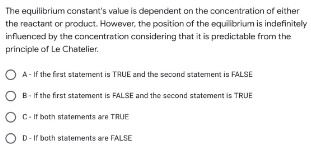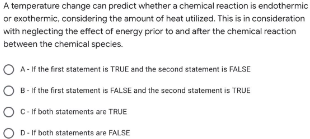The equilibrium constant's value is dependent on the concentration of either the reactant or product. However, the position of the equilibrium is indefinitel influenced by the concentration considering that it is predictable from the principle of Le Chatelier. OA-If the first statement is TRUE and the second statement is FALSE OB-If the first statement is FALSE and the second statement is TRUE OC-If both statements are TRUE D-If both statements are FALSE
The equilibrium constant's value is dependent on the concentration of either the reactant or product. However, the position of the equilibrium is indefinitel influenced by the concentration considering that it is predictable from the principle of Le Chatelier. OA-If the first statement is TRUE and the second statement is FALSE OB-If the first statement is FALSE and the second statement is TRUE OC-If both statements are TRUE D-If both statements are FALSE
Introductory Chemistry: An Active Learning Approach
6th Edition
ISBN:9781305079250
Author:Mark S. Cracolice, Ed Peters
Publisher:Mark S. Cracolice, Ed Peters
Chapter18: Chemical Equilibrium
Section: Chapter Questions
Problem 87E
Related questions
Question

Transcribed Image Text:The equilibrium constant's value is dependent on the concentration of either
the reactant or product. However, the position of the equilibrium is indefinitely
influenced by the concentration considering that it is predictable from the
principle of Le Chatelier.
A-If the first statement is TRUE and the second statement is FALSE
B. If the first statement is FALSE and the second statement is TRUE
C-If both statements are TRUE
D-If both statements are FALSE

Transcribed Image Text:A temperature change can predict whether a chemical reaction is endothermic
or exothermic, considering the amount of heat utilized. This is in consideration
with neglecting the effect of energy prior to and after the chemical reaction
between the chemical species.
OA-If the first statement is TRUE and the second statement is FALSE
OB-If the first statement is FALSE and the second statement is TRUE
OC-If both statements are TRUE
D-If both statements are FALSE
Expert Solution
This question has been solved!
Explore an expertly crafted, step-by-step solution for a thorough understanding of key concepts.
Step by step
Solved in 3 steps with 2 images

Knowledge Booster
Learn more about
Need a deep-dive on the concept behind this application? Look no further. Learn more about this topic, chemistry and related others by exploring similar questions and additional content below.Recommended textbooks for you

Introductory Chemistry: An Active Learning Approa…
Chemistry
ISBN:
9781305079250
Author:
Mark S. Cracolice, Ed Peters
Publisher:
Cengage Learning

Introduction to General, Organic and Biochemistry
Chemistry
ISBN:
9781285869759
Author:
Frederick A. Bettelheim, William H. Brown, Mary K. Campbell, Shawn O. Farrell, Omar Torres
Publisher:
Cengage Learning

Chemistry for Today: General, Organic, and Bioche…
Chemistry
ISBN:
9781305960060
Author:
Spencer L. Seager, Michael R. Slabaugh, Maren S. Hansen
Publisher:
Cengage Learning

Introductory Chemistry: An Active Learning Approa…
Chemistry
ISBN:
9781305079250
Author:
Mark S. Cracolice, Ed Peters
Publisher:
Cengage Learning

Introduction to General, Organic and Biochemistry
Chemistry
ISBN:
9781285869759
Author:
Frederick A. Bettelheim, William H. Brown, Mary K. Campbell, Shawn O. Farrell, Omar Torres
Publisher:
Cengage Learning

Chemistry for Today: General, Organic, and Bioche…
Chemistry
ISBN:
9781305960060
Author:
Spencer L. Seager, Michael R. Slabaugh, Maren S. Hansen
Publisher:
Cengage Learning

Chemistry: An Atoms First Approach
Chemistry
ISBN:
9781305079243
Author:
Steven S. Zumdahl, Susan A. Zumdahl
Publisher:
Cengage Learning


Chemistry
Chemistry
ISBN:
9781305957404
Author:
Steven S. Zumdahl, Susan A. Zumdahl, Donald J. DeCoste
Publisher:
Cengage Learning